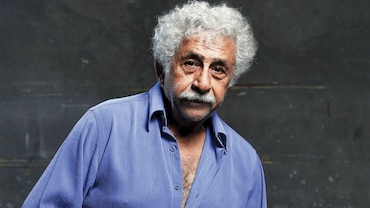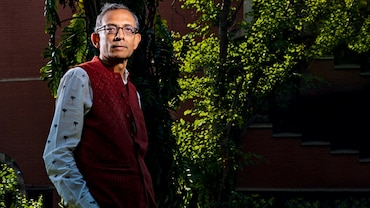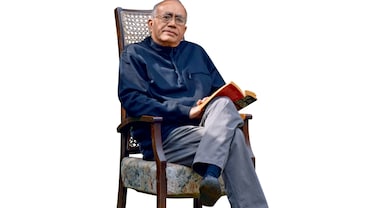Not Keeping MUM
Writer–actor Kalki Koechlin chats with us about her new illustrated book The Elephant in the Womb and why it’s important to be candid about the challenges of pregnancy and motherhood

Why did you decide to write the book? Also, why the title The Elephant in the Womb?
I was stuck in a lockdown and suddenly thrown into motherhood without much experience. I found myself journaling and doodling through it because I thought I needed to remember these things and then it just kind of grew into this project. I spoke to my illustrator friend, Val (Valeriya Polyanychko), and we decided to make it into something. The title came after a lot of brainstorming. I came up with The Elephant in the Womb, which I thought was appropriate because we never really talk about the real difficulties of motherhood—only about how beautiful it is. And no doubt, it is beautiful, but I wish people would also talk about the toughness, because getting over that is what makes it even more precious.
Pregnancy books by celebrities,I feel, are often written from a place of privilege. Your book, however, avoids that.
I wrote in the introduction that I know come from this place of privilege. ButI also wrote from a very personal space and there are some universal things that all of us go through. I think when we bare our secrets, people relate to that more because we’re all thinking it in our heads but not talking about it. Why was it important to begin the book by talking about your abortions? When I initially wrote the first chapter,it was just a couple of lines saying that I've had abortions. But then I realized that this is talked about so little. WhenI dug deeper, I saw there was a stark difference between the two abortions.In the first one, I was younger, didn’t have support, and it was so taboo. I didn't want to tell my family or anybody. Only I and the man I was with knew about it. I was probably sad-der during the second one because I did want children, but I wasn’t ready to have a child alone. But I had my gynaecologist calling me, my brother and his fiancé staying with me and all my friends checking on me. It made me realize that for a support system to exist for all of us, we need to stop making abortion such a taboo subject.

I have to confess, at the end of one bad day—with work, my three-year-old and much else—I logged on to Instagram and saw you singing a lullaby to your daughter, Sappho,and I felt like the worst parent ever.Do you ever feel mommy guilt,especially with social media?
Of course. In fact, in my book, I think I wrote my lullaby at the end of the sixth chapter titled Postpartum Blues. I actually wrote that lullaby on one of my worst days—I had a huge fight with my partner, I hadn’t slept and I was feeling really down. I was rocking Sappho and I just started singing this tune in this exhausted state. And then later, of course, I developed it into a song. But that tune came out of some of the worst times. So, sometimes, doing something creative like singing or humming is just a coping mechanism—something which doesn’t use the brain and comes from some other part of you. I do follow some wonderful people like PaulaKuka, Katie Kirby and Mothercould(Myriam Sandler) ... but I also have times where I switch off from social media because I feel like this comparison is so difficult. We’re supposed to be supermoms because we are in a generation where we have to take care of the house, continue our careers and, you know, keep it all up.
You had postpartum depression.Did you have any misconceptions about it before?
The best thing I read about it was a chapter in the book The Mental Load by Emma. Basically, she says, if you take any human being and lock them in a room, don’t give them sleep and wake them up every two hours with an alarm, they will go crazy. That’s why sleep deprivation is one of the main forms of torture. It really affects your mental health and who you are. So, I feel labelling women as ‘depressed’ is very harsh. I think it should be seen as a natural process and should be given more support in terms of caregiving. Family or close people around should recognize it for what it is, which is a serious depletion of hormones and vitamins along with deep exhaustion. If someone is injured or sick, you would come and take over, right? It’s a little complicated, but I feel like it can, again, be something that’s less taboo.
Kids vow to be different from their parents once they grow up. Has your childhood influenced your parenting style?
I feel I’ve gotten lots of positive and negative things. On the one hand, this whole idea of a water birth and natural birth came from the fact that my mom gave birth at home in Pondicherry at five in the morning. There was no electricity. So, I was like Wow, maybe I can do this. But then on the other hand, I feel like my parents were angry people—they were shouting, they would fight in front of me all the time. There was, you know, slapping around. And I don’t want to repeat those things. So, I’m very conscious about how Guy(Hershberg, her partner) and I fight—like finding a way to discuss it later. All of those are big challenges, but you find yourself in the same trap of getting angry, frustrated or snapping, and you got to really work on it.
You are shooting for season 2 of Made in Heaven and the film Goldfish with Deepti Naval, who plays your mother battling dementia. What made you accept the movie? Also,what is Faiza now up to in the web series?
Pushan (Kripalani, the director) came to me four years ago with the idea but there was no funding to make the film. It was during the lockdown last year that he said he has found a producer and that the project is happening. I thought the idea was very relevant as there are so many grandparents that I know or even parents of people I know, who are suffering from some kind of dementia ... It’s also sort of set in this mixed, British–Indian world and my character is particularly very British as she is born and brought up there (the movie was shot in the UK). Her mother is Indian and her father,English. It also deals with identity and all that. It’s a very beautiful script. I can't really tell you much about Made in Heaven but definitely Faiza has a few more complications here.






